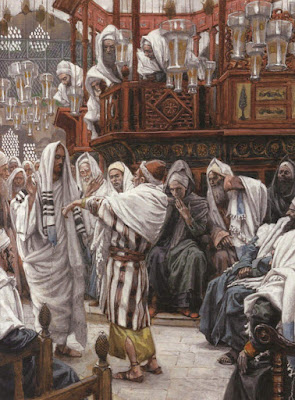JESUS DEFENDS HEALING A WITHERED HAND ON THE SABBATH
(Probably Galilee)
MATT. 12:9-14
MARK 3:1-6
LUKE 6:6-11
On another sabbath, Jesus visits a local synagogue (probably in the same area where they gleaned the fields). Here he encounters and heals a man with a withered hand. The Pharisees question the lawfulness of healing on the sabbath and consort with the Herodians to destroy him.
It's interesting that Jesus points out how it is absurd to be kind to an animal (lifting it out of a pit for your own profit or for compassion) but not to care equally for a human being. I feel people can be as equally indifferent to human suffering in our culture, treating their animals as if they were human extensions of themselves but lacking compassion for other humans they encounter on their daily rounds. Perhaps part of the lesson here is that we should continually put people first and examine the illogical discrepancies and tendencies of our imperfect hearts.
 |
| "The Man with the Withered Hand," James Tissot |
Mar 3:5 "And he looked around at them with anger, grieved at their hardness of heart...."
"When he had looked round on them with anger (periblepsamenos autous met' orgēs). Mark has a good deal to say about the looks of Jesus with this word (Mar_3:5, Mar_3:34; Mar_5:37; Mar_9:8; Mar_10:23; Mar_11:11) as here. So Luke only once, Luk_6:10. The eyes of Jesus swept the room all round and each rabbinical hypocrite felt the cut of that condemnatory glance. This indignant anger was not inconsistent with the love and pity of Jesus. Murder was in their hearts and Jesus knew it. Anger against wrong as wrong is a sign of moral health (Gould). -Robertson's Word Pictures
This pithy comment reflects some of my struggle with the Catholic faith as a child. But, I must remember it's not a struggle against Catholicism or restricted to Catholicism. All branches of Christianity must be on guard not to let empty ritual become the norm.
"Ceremonies are only expressions of life, and where life is wanting, they are meaningless and void." -F.B. Meyer
"He [Christ] contended also that all ritual observance must take the secondary place, and that the primary concern must always be the deep and pressing claims of humanity." F.B. MeyerHe redirected the emphasis from observing ceremony and law to caring for people. Jesus was a contextualist, looking at the big picture.
"It [the sabbath] was ordained at first for the benefit of man, and, therefore, it was never intended that it should operate to his detriment." -BIOn neglecting good we could do:
"In God’s account there is no difference, in regard of simple unlawfulness, between not doing good to the body or life of our neighbour, in the case of necessity, and doing hurt unto them: he that doth not good to the body and life of his neighbour (when his necessity requireth, and when it is in his power) is truly said to do hurt unto them, at least indirectly and by consequence. Let this move us not only to forbear hurting our neighbour, but also to make conscience of doing good to him." G. Petter, -BI
The rules of the Pharisees made the Sabbath question wholly a matter of doing or of not doing. But Jesus made it a question of doing good and his question implies that a failure to do good, when one is able, is harmful and sinful. "The ability," says Cotton Mather, "to do good imposes an obligation to do it." To refrain from healing in such an instance would have been to abstain from using a power given him for that very purpose. -FGThe Fourfold Gospel also points out that the Jewish leaders' consortion with the Herodians further reveals their evil intent and state of heart. The Herodians were a Hellenistic Jewish party that supported Herod the Great. These two groups united in their desire to "destroy" Jesus.

No comments:
Post a Comment